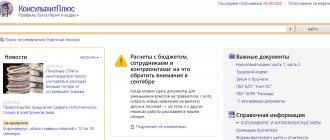The Tax Code is the main regulatory act that regulates the legal application of tax regimes by business entities and governs other aspects of taxation. In August 2021, Law 303-FZ introduced significant changes to the Tax Code, in particular affecting VAT. So, from 2021, the amount of the specified fee will increase by 2%. In the article we will talk about the 20 percent VAT rate, government measures aimed at stabilizing the tax burden on commercial structures, and provide formulas for calculating the above tax.
Reflash of online cash registers for 20% VAT throughout Russia in 30 minutes!
Leave a request and receive a consultation within 5 minutes.
Benefit for IT companies
The VAT benefit provided for in paragraphs will be applied in a new way. 26 clause 2 art. 149 of the Tax Code of the Russian Federation. Starting from the new year, transactions for the sale of exclusive rights to computer programs and databases included in the unified register, as well as the transfer of rights to use these programs and databases, will not be taxed.
The exemption does not apply to the transfer of rights to use computer programs and databases if these rights consist of obtaining the ability to:
- distribute or access advertising on the Internet;
- post offers on the Internet for the purchase or sale of goods, works, services and property rights;
- search for information about potential buyers and sellers or enter into transactions.
That is, now it will not matter under what contract the computer programs were purchased: licensed or not. This means that the purchase of computer programs from foreign organizations will always be subject to VAT .
Because the benefits raised a lot of questions among industry representatives, and the Federal Tax Service had to issue official clarifications.
Read explanations of IT benefits from January 1, 2021
Only developers whose revenue from software production is more than 90% can take advantage of the benefits. Do not forget that the company must also be included in the register of domestic software.
More about zero rates
An additional change in the payment of VAT from 2021 at a zero rate is the possibility of not officially applying the export exemption. The opportunity to refuse the 0% VAT rate applies to the export of goods or their transportation.
A waiver of the zero rate is possible for all export transactions as a whole, provided that an application is submitted to the Federal Tax Service no later than the 1st day of the quarter from which the taxpayer plans to pay VAT at the regular rate. The total period of refusal is no less than a year.
The meaning of such a waiver of the zero rate comes down to the possibility of deducting VAT billed at rates of 18% or 10% by those suppliers who, having the right to a zero rate, do not want to confirm it, as a result highlighting the regular tax in invoices. This situation can be seen quite often in relationships with Russian international carrier companies. Their services are subject to VAT at a zero rate, but this requires confirmation. Until now, if the invoice of such a company indicated VAT of 18% instead of zero VAT, controllers recognized this rate as incorrect (letter of the Federal Tax Service of Russia dated July 7, 2021 No. SA-4-7 / [email protected] ), and with The judges were in agreement with them (decision of the Supreme Court of the Russian Federation dated January 26, 2021 No. 304-KG15-18260). Accordingly, it was unlawful to deduct VAT on such a document. But the described amendment to Chapter 21, which provides changes in the payment of VAT in 2018 at a zero rate, as well as the possibility of abandoning it, should eliminate this problem.
Transition from UTII to OSNO
For persons who have switched from UTII to OSNO, a deduction of input VAT if goods, work, services, property rights were acquired during the period of application of UTII or imported into the territory of the Russian Federation, but were not actually used before the transition to OSNO.
OSNO is still a complex and tax-expensive system. For small businesses, it is most likely more profitable to be simplified. We have prepared two useful materials - a digest on how to deal with payments and obligations during the transition period, as well as a checklist for changing UTII to simplified tax system.
20% VAT rate: contracts
Contracts are agreements that companies sign when starting cooperation with each other. Contracts are usually concluded for a year or longer.
Enterprises stipulate in contracts their rights and obligations, the timing of their implementation, and indicate the total cost of the agreement. Price is one of the significant obligations of the contract. It is better to initially include all required fees.
When switching to a 20% VAT rate for contracts concluded before 2021 and valid after January 1 of the same year, business owners will be required to increase the amount of the fee. There are several ways:
- an increase in prices in proportion to the increased tax;
- reduction of the tax base - amounts without collection.
In any case, the supplier is obliged to agree on all conditions with the buyer. After reaching verbal agreements, the company sends the buyer a letter and an additional agreement to change the contract amount and its components.
Attention: companies that participate in government procurement do not have the right to increase the total contract price or change other essential terms of the agreement (regulatory act 44-FZ). In this case, additional costs are borne by the supplier.
If the agreement only mentions the tax base or does not indicate a fixed tax amount, but contains a link to the corresponding article of the Tax Code, then it is not necessary to draw up an additional agreement. In this case, the new tax value will be applied by default, in accordance with current legislation.
Transfer of cash registers to VAT 20% and FFD 1.05 in 30 minutes from 600 rubles!
Leave a request and receive a consultation within 5 minutes.
Calculation of VAT in bankruptcy
From January 1, 2021, transactions for the sale of goods, works, services manufactured and (or) purchased (performed, provided) in the course of business activities after the debtors are declared bankrupt will not be recognized as subject to VAT.
In 2021, there was a moratorium on creditors filing bankruptcy applications. Over the first 9 months of 2021, 708 companies and 146 individual entrepreneurs took advantage of this right.
The moratorium has been extended until January 2021, analysts suggest, after which a surge in the number of applications is possible.
Tax Free Amendment
Foreigners who purchased various goods or souvenirs while traveling around Russia still could not claim the right to a VAT refund, the so-called Tax Free, which is widely known and used in a similar situation by Russians coming from abroad. Changes to VAT from January 1, 2021 will eliminate this injustice. A new article 169.1 of the Tax Code has been introduced, establishing the procedure for tax refunds for citizens of countries not belonging to the EAEU customs union.
Thus, those tourists who, within one calendar day, purchased goods in the territory of the Russian Federation worth at least 10 thousand rubles, including tax, will be able to claim a VAT refund. In this case, it will be possible to return the tax through a special operator at the airport - by bank transfer or in cash.
Sellers who participate in this scheme, subject to a number of conditions, will be able to deduct VAT that was returned to foreigners. The right to deduction in such a situation can be used within one year from the moment when the foreign buyer was compensated for the tax.
New invoice details
As of July 1, 2021, amendments will come into effect regulating the traceability system for imported goods . This system is being created to confirm the legality of the circulation of goods in the EAEU, prevent the import of counterfeit products into the territory of the Russian Federation, increase the competitiveness of domestic goods, and reduce gray imports.
The Government of the Russian Federation will establish a list of goods, the sale of which will fall under the tracking system. A procedure for providing information to the tax office will also be developed.
When selling traceable goods, it will be necessary to issue invoices, including adjustment ones, in electronic form.
Exceptions are provided:
- sale of goods to self-employed citizens, as well as individuals for personal, family, household and other needs not related to business activities;
- re-export;
- sale and movement of goods from the Russian Federation to the territory of another EAEU state.
To do this, new details will be added to the invoice form:
- registration number of the batch of goods subject to traceability;
- a quantitative unit of measurement of a product that is used for traceability purposes;
- quantity of traceable goods.
At the same time, the absence (failure to indicate) of these details in the invoice will not entail a refusal to deduct VAT from the buyer.
Reasons for increasing VAT to 20%
In May, the president signed a decree that sets tasks for the government of the country aimed at developing the economy, science and other areas, and improving the well-being of Russian citizens. The implementation of these tasks is associated with an increase in VAT to 20%.
According to forecasts by the leadership of the Russian Federation, changes in the tax rate will bring an additional 600-700 billion rubles to the state budget every year. These tools will help:
- increase pension payments;
- change the poverty threshold indicator downwards;
- increase the well-being of citizens and improve their purchasing power;
- maintain the inflation rate no higher than 4 percent;
- stabilize and develop the state's economy;
- increase the export capacity of the Russian Federation.
Also, a 2 percent increase in value added tax will make it possible to implement other development goals set out in V. Putin’s May decree.
Subscribe to our channel in Yandex Zen - Online Cashier! Be the first to receive the hottest news and life hacks!
New form of VAT declaration
It will already need to be completed in the 4th quarter of 2021. The following changes have been made to the VAT return:
- barcodes have been replaced
- the line in which information about the OKVED code was previously displayed was removed from the title page,
- lines have been added to section 1 for information about the protection and promotion of investment,
- new codes have been added for the free transfer of property to fight COVID-19 or participate in the research of Antarctica,
- codes have been introduced for operations for the sale of services at international airports and services for the management of municipal solid waste,
- new codes for the IT industry.
Legal basis for VAT innovations from July 1, 2017
Innovations in working with VAT from July 1, 2021 arose thanks to three laws:
- “On Amendments...” dated November 30, 2016 No. 401-FZ, which supplemented the procedure for using the application procedure for reimbursement and expanded the list of situations for tax recovery;
- “On introducing amendments...” dated 03/07/2017 No. 25-FZ, which included in the Tax Code of the Russian Federation a new condition for the non-taxation of medical products and the application of a preferential rate on them;
- “On amendments...” dated 04/03/2017 No. 56-FZ, which affected the list of invoice details.
Based on their significance, these innovations can be divided into three groups:
- relating to all taxpayers - in terms of changing the details of the main document used in VAT transactions: invoices;
To learn about what other changes await the invoice in the near future, read the publication “New changes are coming to the invoice form.”
- interesting for VAT payers declaring tax to be refunded from the budget - on innovations in terms of the declaration procedure for refund;
- relating to a limited circle of persons - for situations requiring tax restoration, as well as for allowing the use of an exemption or a preferential 10 percent rate.
We will consider them in order of importance.
New forms of registers of customs declarations
Registers of customs declarations are provided to the tax authorities to confirm the right to apply a 0% VAT rate when making export shipments.
From 01/01/2021, it will be necessary to apply new forms of the register of declarations for goods for express cargo and the register of customs declarations, approved by Order of the Federal Tax Service of Russia dated 08/20/2020 No. ED-7-15 / [email protected]
Details about changes to VAT next year can be heard at the Kontur School seminar “VAT - 2021. Current issues. Changes."
Government measures to facilitate the transition to a 20% VAT rate
Most of the innovations in Russian legislation mainly affect large and medium-sized businesses and end consumers - citizens. In particular, an increase in the VAT rate to 20 percent starting from the 4th quarter of 2021 will lead to an increase in prices for most product groups (except for food, medicine, and goods for children). Such forecasts were voiced by the chief economist of VTB Capital A. Isakova.
In his summer speech, First Deputy Chairman of the Government of the Russian Federation A. Siluanov said that the leadership of the Federation plans to change the Tax Code and pension legislation of the Federation, which will reduce the financial burden on business entities.
In August 2021, regulations 306-FZ and 302-FZ came into force, which stipulate the following:
- The value of the pension fund insurance contribution paid by commercial structures for employees was reduced by 4 percent. Until the end of 2018, a 26 percent rate is in effect, and from 01/01/2019 it will be 22%.
- The amount of tax fees paid over 36 months has been reduced by 5 billion rubles, which allows a business entity to receive a refund of value added tax from the Federal Tax Service using the application method (Article 176.1 of the Tax Code). It will amount to 2 billion rubles compared to the current 7 billion rubles in 2021.
- The deadline for desk checks, which are carried out by Federal Tax Service employees when an enterprise submits an application for reimbursement in an expedited manner, has been reduced by a month. From September 3, 2018, “camera chambers” will last 2 months (Article 88 of the Tax Code).
The innovations described above are designed to “compensate” for the costs of business owners, which will increase along with the 2% increase in the fee.
1. Ask our specialist a question at the end of the article. 2. Get detailed advice and a full description of the nuances! 3. Or find a ready-made answer in the comments of our readers.
Change 2: validity period of the guarantee agreement
From July 1, 2021, the validity period of the guarantee agreement for the application procedure for VAT refund, which we mentioned above:
- must expire no earlier than 10 months from the date of filing the tax return in which the amount of VAT to be refunded is declared;
- it cannot be more than one year from the date of conclusion of the guarantee agreement.
The corresponding amendments are provided for in subparagraph “d” of paragraph 5 of Article 2 of the Federal Law of November 30, 2016 No. 401-FZ. Please note that prior to this change, the bank guarantee must expire no earlier than eight months.
Don't miss out
After the VAT return has been submitted for reimbursement, the guarantee agreement must be valid for at least another 10 months. This rule is effective from July 1, 2021.
Change 3: restoration of VAT when receiving subsidies
Taxpayers will need to restore VAT from July 1, 2021, regardless of which budget they received subsidies for reimbursement of expenses from. At the same time, the procedure for restoring and accounting for the restored tax amount remained the same. The amendments are provided for in paragraph 4 of Article 2 of the Federal Law of November 30, 2016 No. 401-FZ
Note that previously VAT was restored if the subsidy came exclusively from the federal budget. Let us illustrate the essence of the change in the table:
| Amendment | |
| Was | It became |
| Amounts of tax accepted for deduction by the taxpayer on goods (work, services), including fixed assets and intangible assets, property rights, are subject to restoration by the taxpayer in the event that the taxpayer receives subsidies from the federal budget in accordance with the legislation of the Russian Federation to reimburse costs associated with payment for purchased goods (works, services), including tax, as well as reimbursement of costs for paying tax when importing goods into the territory of the Russian Federation and other territories under its jurisdiction. | Amounts of tax accepted for deduction by the taxpayer on goods (work, services), including fixed assets and intangible assets, property rights, are subject to restoration by the taxpayer in cases where the taxpayer receives subsidies for reimbursement of costs from the budgets of the budget system of the Russian Federation in accordance with the legislation of the Russian Federation (including tax) related to payment for purchased goods (work, services), taking into account tax, as well as reimbursement of costs for paying tax when importing goods into the territory of the Russian Federation and other territories under its jurisdiction. |
That is, the point of the innovation is to introduce the obligation to restore VAT in the event of the allocation of subsidies (to cover previously incurred costs) from any budget (local, regional, federal).
The moment when the obligation to recover VAT arises is determined in paragraph 4 of paragraph. 6 clause 3 art. 170 of the Tax Code of the Russian Federation as the quarter in which the subsidy was received. Therefore, for the purpose of VAT recovery, it does not matter when the taxpayer accepted purchases (goods, works, services) for accounting and (or) paid them to the supplier (contractor, performer). VAT is restored in the quarter in which the subsidy funds are credited to the taxpayer's account.
It is worth noting that the amended wording of subparagraph 6 of paragraph 3 of Article 170 of the Tax Code of the Russian Federation still contains the words “including tax”. Consequently, if the subsidy is allocated without taking into account VAT and credited to the current account after 07/01/2017, then the taxpayer will not have the obligation to restore the VAT amounts previously accepted for deduction. In other words, from July 1, 2021, it will be possible to avoid the obligation to restore VAT only if the documents for the allocation of the subsidy state that the subsidy amount does not include VAT.
Change 6: New Invoice Format
From July 1, 2021, it is allowed to generate invoices in electronic form exclusively according to the new format approved by Order of the Federal Tax Service dated March 24, 2016 No. ММВ-7-15/155. Previously, it was possible to choose any of those approved by orders of the Federal Tax Service of the Russian Federation No. ММВ-7-6/93 of 03/04/2015 and No. ММВ-7-15/155 of 03/24/2016, but from July 1, 2021 only the latter remains in force.
An adjustment invoice from July 1, 2021 can also be submitted only in a new format, which was approved by Order of the Federal Tax Service dated April 13, 2016 No. ММВ-7-15/189. For more information, see “Invoice from July 1, 2021: new form and format.”





